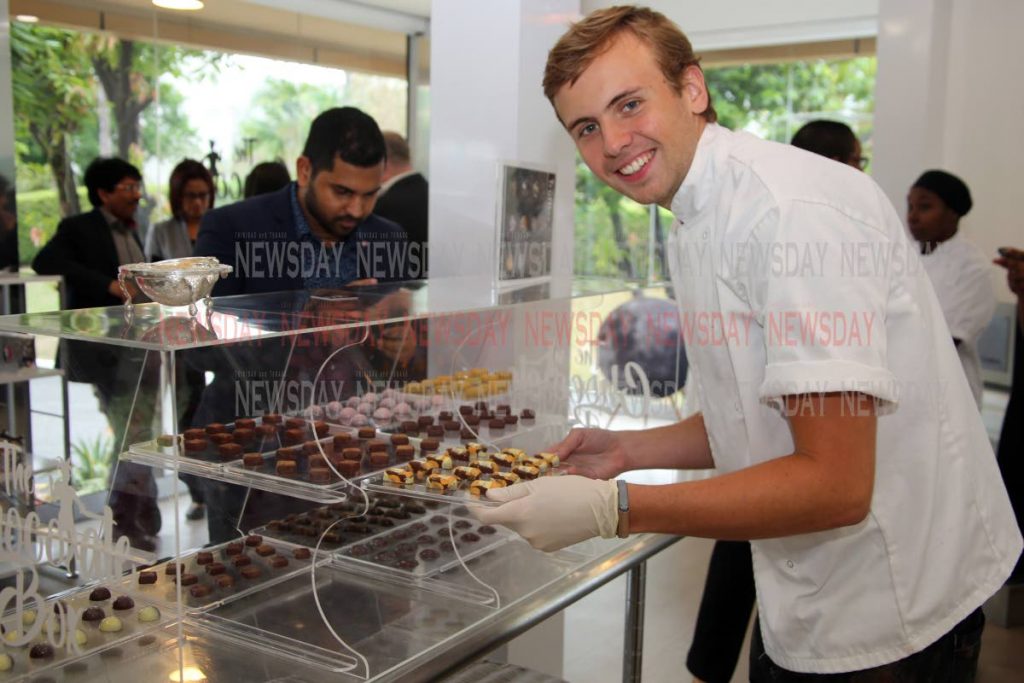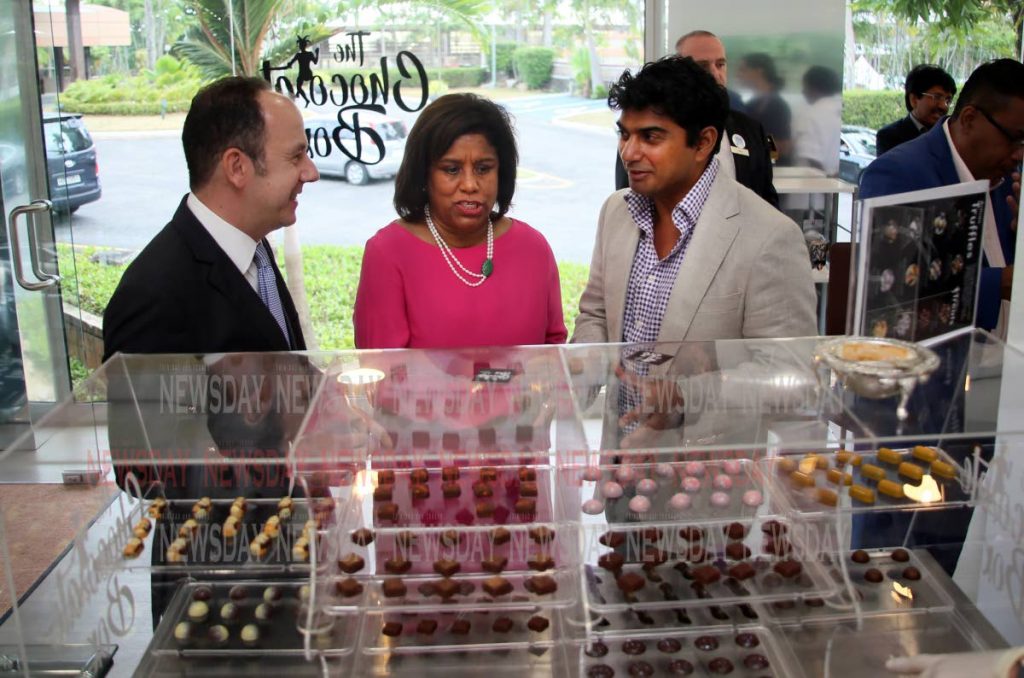The finest cocoa

Ashley Parasram didn’t even know about trinitario cocoa until former British High Commissioner Arthur Snell brought up over lunch one day that the TT cocoa industry was declining. What Parasram had, however, was the expertise to create and execute environmental and sustainability models that could prove transformative in the sector.
“(Snell) knew I was from TT and had 20 years of environmental and sustainability experience, and he felt (the local cocoa industry) was something I should look at,” Parasram recently told Business Day. After 20 years working in sustainable development all around the world, from the Far East, to Scandinavia and South America, for organisations like the UK Development Department and the World Bank, he decided to focus his attention home.
“I felt I should really put my skills in the country I’m from, so it was really on a personal note that I thought charity starts at home, so if I could do something, not just for the cocoa sector but something that encourages agriculture, and sustainable agriculture, then I think it’s well worth the effort,” he said.
And that’s how the concept of the TT Fine Cocoa Co started.
Founded by Parasram in 2016, TT Fine Cocoa is a public-private partnership with the government, through the ministries of agriculture and trade, the Cocoa Development Co of TT (CDCTT), UWI's Cocoa Research Centre and the Agricultural Development Bank all being major stakeholders.
“The partnership works in terms of sharing resources. So UWI provides a lot of their scientific knowledge and research we need. The Ministry of Agriculture (allows us to operate) on the La Reunion Estate and we partner with them by providing technical advice to growers about their beans and how to process them.
"Our facility is also available to other cocoa processors and chocolatiers to use, so they don’t have to worry about finding cocoa beans to make chocolate. That was a key point to try and stimulate the sector.
"We also work very closely with the Ministry of Trade and Industry (and its agencies, ExporTT and InvesTT) because we are very active in trying to promote exports of cocoa.”

Other stakeholders include the Inter-American Development Bank on standards, and the British High Commission on trade promotion and sharing expertise on how to improve local chocolate making. It’s not just one company or entity, Parasram insists.
The company has several aspects. One is capacity-building, to provide knowledge and expertise to people wanting to get into chocolate-making. The other is to provide machinery and technical resources for those who want to process it, as well as for the company itself, to make finished chocolates.
“We want to ensure we demonstrate the versatility of what we produce.”

The company’s cocoa processing plant/chocolate factory is at La Reunion near Arima, a cocoa farm owned and managed by the Ministry of Agriculture, and adjacent to the research centre’s International Cocoa Genebank – the world’s biggest stockpile of genetic material for cocoa. Here, beans are roasted, ground and processed into a variety of products, including cocoa mass (more commonly known as the base for cocoa tea), cocoa butter, cocoa nibs, cocoa powder, coverture (for culinary use, prized by chocolatiers for its high quality, sheen and snap when tempered), and eventually moulded to create unique, fine-flavoured chocolate, crafted out of trinitario cocoa beans.
There’s also The Chocolate Shop, a specialty retail arm recently opened at the Hilton Trinidad, St Ann’s, that makes bars, truffles and bonbons crafted by UK-based master chocolatier Jordan Murphy, and his apprentice, Mary Ethel Grey, who joined TT Fine Cocoa as an intern studying food science at UTT.
There are ten employees overall, many of whom started out of curiosity, unsure of what to expect, but then fell in love with cocoa and chocolate. Tariq Sewnarine, for example, started in IT and on a whim applied when he saw an opening. Now, he’s so well-versed in the process that he leads the tours that come to the factory.
And operations manager Arvind Mahabirsingh, who has a background in accounting, was ready for a career change, when, while studying for his MBA at Arthur Lok Jack Global School of Business, he saw a presentation Parasram was giving on the potential of the cocoa industry and found his calling.
Murphy, a graduate of the Westminster Kingsway Culinary School in London, joined the team when, after getting fed up of always placing second at chocolate-making competitions, the company decided to hire him as a sure-fire way of being the best in the business. “He is here to teach people how to make these truffles. Training and capacity-building is a core part of what we do,” Parasram said.
The factory has a capacity of 50 metric tonnes of cocoa per annum, but that can be quickly doubled as needed. Beans are sourced from a network of partner farmers, who must adhere to the company’s strict quality standards, which conform to the recently launched cocoa guidelines created by the TT Bureau of Standards.
“That’s important because you don’t want any contaminants or bacterial infections in the process, so standards are key to ensure that what you produce is the right quality,” Parasram said.
The financial viability is really dependent on demonstrating the demand for trinitario cocoa, he added, and the company is working on determining exactly where that demand is.
Marketing magic
TT Fine Cocoa’s marketing thrust has three levels: nationally, regionally within Caricom, and internationally with a focus on Europe.
“I think here (the response) has been very positive. People are very interested to support (local chocolate). I think they are aware we have very good cocoa but haven’t been able to convert it properly. There’s been a handful of chocolatiers who have achieved that, and we are excited that number is increasing,” Parasram said.
The regional market is interesting because islands with an influx of tourism import a lot of cocoa to feed that market – and that supply can come from Trinidad.
But Parasram’s biggest coup has been convincing legendary UK retailer Harrods to partner with TT Fine Cocoa and, for the first time in its 184-year history, co-brand a product with another company.
“They were truly taken aback with how unique our chocolate is and were so impressed they were willing to endorse it themselves. And it’s not that they are just selling the chocolates, they designed the packaging, presented it and launched it at the top floor of Harrods with 50 guests and lots of champagne, so, you know they really did want to say (they) support this idea of working closely with farmers and having a better understanding of origin and acknowledging the quality we put in it.”
How did he manage to score such a major endorsement?
“Like everything in life, you ask,” he laughed. “You ask and continue to ask and eventually they get tired of you and give up. So I think one has to realise that something like this requires some sort of persistence.”
The whole process is unique, he said, in the sense that it was very much driven by Harrods’ managing director, Michael Ward, who personally oversaw the launch.
“I think it’s a testament to him that he was motivated to do it and he saw that what we had was truly a unique product. We are continuing to work with Harrods. I have a meeting in London with the new director of foods to see what the next set of chocolates will be, and we continue to build our partnership with other restaurants and hotels.”
The magnitude of being promoted by an internationally renowned brand like Harrods is not lost on Parasram. But, he said, for TT’s cocoa to really make a mark, there needs to be more openness and encouragement and support.
“I think before you go out in the world one has to really look at what you have in Trinidad and understand the institutions and understand how we can support and encourage each other. From that platform, the job of selling externally becomes easier.”
Buy-in to cocoa
Farmers are among the industry’s biggest stakeholders, something Parasram appreciates, which is why TT Fine Cocoa makes a point of being supportive.
“We’ve noticed an improvement in farmers who are committed to producing good-quality beans and doing fermentation and drying properly and following procedures, and that’s quite exciting to see. It’s hard to get a good value for a product that is substandard; therefore they understand that if they get a good-quality bean they are likely to get the better price.”
Part of that value is increasing output, but farmers have been reluctant to commit to increasing yields unless they have a guaranteed market. TT Fine Cocoa can be that market, but it can take some work getting that message through to farmers.
“That’s the trust element that is needed between the two parties. So what I would like to see is a stronger element of trust and partnership and understanding, and really what the sector needs as a whole is more collaboration and less scepticism and negative thinking, more on open transparency and a sense of partnership and collaboration.”
There is a sense of fatigue among farmers, he said, and the lack of trust is understandable because of waiting for so long for the promised transformation of the cocoa industry.
“What we’ve tried to do then with this process is reassure people that it can be different. So, the process for us is as important as the output. And process and collaboration is key.”
Getting buy-in from policymakers was a lot easier.
“(The pitch) wasn’t that difficult in the sense of generating interest and the importance of diversification. Pitching (the company) and building it were not difficult. Getting it established has been a challenge. This will take an investment of five to ten years before it’s really settled.”
There would not be a TT Fine Cocoa or a Chocolate Box or even chocolate in Harrods if not for the partnerships that made the process happen, Parasram said, so singling out one person is impossible.
“It is a very complex network of agencies, institutions, government, NGOs, research institutions, private sector, banks, that have all basically come together to get it this far. What we’ve said is once we’ve identified what the strategy is for the sector, collectively, we will present these results. We are one cog in the watch.”
The company’s short-term plans, then, are to get its house in order.
“It is working with farmers, getting farmers to feel supported, getting the right quality, getting processing and packaging right – these are not quick wins. I’m not going to suddenly say that we are ready for international markets, because Trinidad is not. We are yet to put in place something that would be competitive on the international market. But we are getting it together, we are putting the pieces together.”
It all comes down to having a clear process in mind, and accepting that it’s going to be a long road, Parasram said, so the support of a good team is critical.
“And no matter what anyone else says negatively, persevere and push forward.”
The company was started really to improve access to farmers to markets and that is still the core focus. Part of that includes sustainability, getting investment and creating market awareness.
“We are quite keen on delivering. For us, developing and working in partnership is a key attribute, and we are seeing more and more people investing in cocoa, there are more and more companies being (started). We are very excited to see other companies in TT win international awards.
"It’s very exciting when you’ve got other people passionate about making chocolates. I think that’s wonderful.”


Comments
"The finest cocoa"